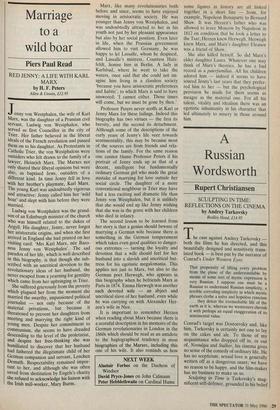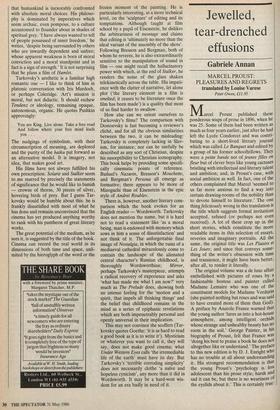A Russian Wordsworth
Rupert Christiansen
SCULPTING IN TIME: REFLECTIONS ON THE CINEMA by Andrey Tarkovsky
Bodley Head, f14.95
The case against Andrey Tarkovsky both the films he has directed, and this beautifully designed and sensitively trans- lated book — is best put by the narrator of Conrad's Under Western Eyes: That propensity of lifting every problem from the plane of the understandable by means of some sort of mystic expression is very Russian. I suppose one must be a Russian to understand Russian simplicity, a terrible corroding simplicity in which mystic phrases clothe a naive and hopeless cynicism . . . they detest the irremediable life of the earth as it is, whereas we westerners cherish it with perhaps an equal exaggeration of its sentimental value.
Conrad's target was Dostoevsky and, like him, Tarkovsky is certainly not one to lay on the cakes and ale. To those of my acquaintance who dropped off in, or out of, Nostalgia and Stalker, his cinema gives no sense of the comedy of ordinary life. He has no scepticism; sexual love is generally written off as a dangerous snare; we have no reason to be happy, and the film-maker has no business to make us so.
Sculpting in Time is Tarkovsky's mag- nificent self-defence, grounded in his belief that humankind is inexorably confronted with absolute moral choices. His philoso- phy is dominated by imperatives which seem archaic, even pompous, to a culture accustomed to flounder about in shades of spiritual grey. 'I have always wanted to tell of people possessed of inner freedom,' he writes, 'despite being surrounded by others who are inwardly dependent and unfree; whose apparent weakness is born of moral conviction and a moral standpoint and in fact is a sign of strength.' It is not surprising that he plans a film of Hamlet.
Tarkovsky's aesthetic is a familiar high romantic one — I like to think of him in platonic conversation with Iris Murdoch, or perhaps Coleridge. Art's mission is moral, but not didactic. It should eschew Tendenz or ideology, remaining opaque, autonomous, organic. He quotes Pushkin approvingly: You are King. Live alone. Take a free road And follow where your free mind leads you . . .
The nudgings of symbolism, with their circumscription of meaning, are deplored and the purity of the haiku put forward as an alternative model. It is imagery, not idea, that makes good art.
His films have not always fulfilled his own prescription. Solaris and Stalker seem to me marred by precisely the statements of significance that he would like to banish — crowns of thorns, 30 pieces of silver, hovering birds of prey. But I guess Tar- kovsky would be humble about this: he is frankly dissatisfied with most of what he has done and remains unconvinced that the cinema has yet produced anything worthy to rank with his pantheon of great literary works.
The great potential of the medium, as he sees it, is suggested by the title of the book. Cinema can record the real world in its dimensions of both time and space, unli- mited by the hieroglyph of the word or the frozen moment of the painting. He is particularly interesting, at a more technical level, on the 'sculpture' of editing and its temptations. Although taught at film school by a pupil of Eisenstein, he dislikes the arbitrariness of montage and claims that editing is 'ultimately no more than the ideal variant of the assembly of the shots'. Following Bresson and Bergman, both of whom he reveres, he is also extraordinarily sensitive to the manipulation of sound in film — one might recall the hallucinatory power with which, at the end of Stalker, he renders the noise of the glass shaken telekinetically across the table. His impati- ence with the clutter of narrative, let alone plot (`the literary element in a film is smelted; it ceases to be literature once the film has been made') is a quality that most of us find harder to swallow.
How else can we orient ourselves to Tarkovsky's films? The comparison with Dostoevsky is fast becoming a reviewer's cliché, and for all the obvious similarities between the two, it can be misleading: Tarkovsky is completely lacking in Slav- ism, for instance; nor can he usefully be described as any sort of Christian, despite his susceptibility to Christian iconography. This book helps by providing some specifi- cally cinematic points of reference. Butluel's Nazarin, Bresson's Mouchette, and Bergman's Persona all emerge as formative; there appears to be more of Mizoguchi than of Eisenstein in the epic style of Andrei Roublev.
There is, however, another literary com- parison which the book evokes for an English reader — Wordsworth. Tarkovsky does not mention the name, but it is hard not to read a statement like 'as a moral being, man is endowed with memory which sows in him a sense of dissatisfaction' and not think of it. The unforgettable final image of Nostalgia, in which the ruins of a mediaeval cathedral miraculously come to contain the landscape of the alienated central character's Russian childhood, is thoroughly Wordsworthian; Mirror, perhaps Tarkovsky's masterpiece, attempts a radical recovery of experience and asks `what has made me what I am now?' very much as The Prelude does, showing both an intense feeling for the 'motion and a spirit, that impels all thinking things' and the belief that childhood remains in the mind as a series of epiphanic revelations which are both impenetrably personal and openly universal in their implication.
This may not convince the scoffers (Tar- kovsky quotes Goethe: 'it is as hard to read a good book as it is to write it'). Mysticism or whatever you want to call it, they will say, does not make good cinema; what Under Western Eyes calls 'the irremediable life of the earth' must have its day. But Tarkovsky's 'terrible corroding simplicity' does not necessarily clothe 'a naïve and hopeless cynicism', any more than it did in Wordsworth. It may be a hard-won wis- dom for an era badly in need of it.



























































 Previous page
Previous page